Producing Potable Water
The EcoFiltro has won awards for sustainable technology, now there is a need to make many more of them
written by Michael Sherer
On the outskirts of La Antigua Guatemala, set back in a corner of the 22-acre, lushly planted Finca El Pintado, is the factory that churns out daily miracles: clay pots, crafted from the best deposits from Rabinal, mixed with pine sawdust, fired in a brick kiln and then brushed with a coating of colloidal silver. There are a few more steps to this process but nothing resembling rocket science: What is this local miracle?
EcoFiltro!
Invented and perfected by Dr. Fernando Mazariegos in the early 1990s, it won awards from the World Bank for sustainable technology in 2003 and 2004. Today, Philip Wilson, director of EcoFiltro, produces 2,500 filters a month, which are shipped to the four corners of the Earth. His largest client is World Vision, a Christian public service organization serving over 100 million people in over 100 countries.
The process: the clay is mixed with carefully screened pine sawdust until the proper consistency is achieved. There are three molds for the pots. The clay/sawdust mixture is poured into a mold. Squeeze gently and remove molded form. Place on drying rack. Fire in kiln. Test for porosity. Brush on the colloidal silver solution, a natural anti-bacterial, and bingo—a gravity-based filter that traps bacteria, parasitic cysts, fecal residues, smell and color. And it also removes any turbidity, which is the final taste/visual test for the recipients (clarity). Add water from any source and wait. The finished filter produces one to two liters an hour of cool, deliciously pure water.
This is a very simple but elegant approach to much of the developing world’s predicament—no access to pure, clean water. In Guatemala, for example, it is estimated that at least 75 percent of the water available to the rural areas is contaminated. For the price of an EcoFiltro, Q275 ($34.33USD), a family can have fresh water daily, eliminating the charges for bottled water indefinitely or buying wood to heat and boil water. The interior filter lasts for a year, although it has been said that it can function beyond the stated shelf life, and costs Q175 ($21.84 USD) to replace.
Today, Wilson wishes to expand and double the output. Funded by other non-profit organizations from around the world, his foundation constantly struggles to keep up with demand. Mr. Wilson, 41 and a graduate of Notre Dame and the Wharton School of Business (MBA), is looking at another location to expand. The current buildings have stacks of drying clay pots lining the yard, the halls and until lately, the roof.
“My vision,” he explained, “is to provide pure and safe drinking water to anyone and everyone who needs it. We have a simple process that is ecologically clean and green, with no moving parts and minimal maintenance and costs. Our only need is for more publicity and exposure … and a larger factory.”
His current brainstorm is to reduce what he calls the “plastic footprint” in La Antigua—the purchase and use of bottled water and the subsequent disposal of empty plastic bottles in landfills. By stationing his units in strategic locations throughout the city, offering free refills to any and all, he reckons there will be a significant reduction of plastic throwaways. Offering an immediate positive impact on the environment of La Antigua, this is a model that other cities and countries might want to consider.
A few local organizations are taking advantage of this remarkable invention. For example, the American Legion recently donated 10 large units to a nearby school. The school saves the Q1500 ($187 USD) per month that it had been spending on bottled water. ($187 is the equivalent of monthly tuition for 1.5 students.)
The filters also can be invaluable in the home when the municipal water supply is disrupted by earthquakes, hurricanes or power failures. We might not have ice when the electricity goes out but we will have fresh water from whatever water might be available.
Want to help or lend a hand? The Boy Scouts in the United States are road-testing these units on their walk-about following the Lewis and Clark expedition, and not relying on costly bottled water. Reducing the volume of plastic bottles is good for the planet and you. Contact Philip Wilson and offer your support, visit www.ecofiltro.com to learn more.
photos by Michael Sherer
- A step in the process: clay and pine sawdust are poured into molds
- Drying the finished pots in the sun
- Checking the clay EcoFiltro pots for porosity
- Philip Wilson with a display of various models of the EcoFiltro
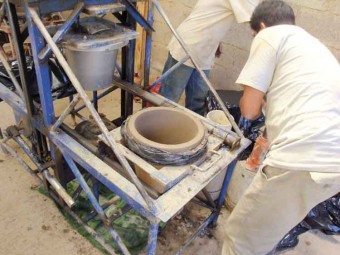
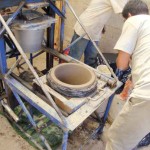
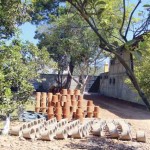
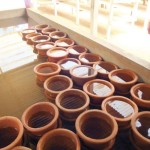
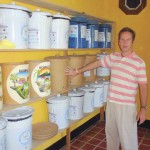
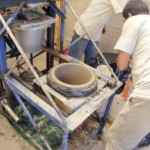
I am so impressed! I had heard and seen of the EcoFilter, but did not know the scope of production. Bravo! Hope you are able to continue on with this good work you are doing, and that I am able to help in some small way. God Bless!
Please could you inform me where i can purchase 1 of these or maybe more of these Eco filters?
i have family in the Philipines living nearby a river with contaminated water,
i wish to send one or more of these eco filters to them
kind regards
H.Hallers
Sorry, I posted the wrong name: It’s EcoFiltro (spanish spelling) at ecofiltro (dot) org. There’s a contact form you can fill out on their website, or contact them here:
Please send your tax deductible donation to:
Family of the Americas Foundation
5929 Talbot Rd.
Lothian, Maryland 20711
Note: Checks payable to:
Family of The Americas Foundation
this Foundation is a 501 (c)-3
Factory Ecofiltro Antigua:
Telephone: (502) 79346208/ 79346526
Res. San Pedro Panorama, Casa 13 “A”
Antigua, Guatemala (Camino Ciudad Vieja)
Guatemala City:
10:00 to 20:00 hrs.
Tel.: (502) 22507224
C.C. Eskala Roosevelt, kiosko sótano1
Calz. Roosevelt Km. 13.8
Tel. (502) 58461836
C.C. Santa Clara, kiosko 1er. nivel
Km. 17.5 Carr. CA-9 Sur Villa Nueva
CC. Metronorte Km. 5.5 carretera al Atlántico zona 17
Teléfono: (502) 22560002 2do. Nivel
Am interested in helping spread the word, or whatever else. I visit Guatemala annually and see the need first-hand for potable water.